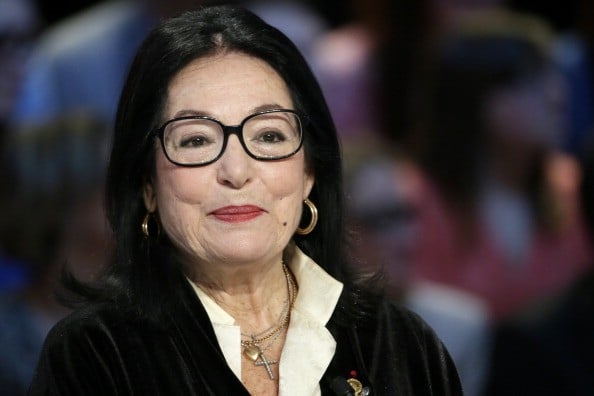What is Nana Mouskouri's Net Worth?
Nana Mouskouri is a Greek singer and former politician who has released over 200 albums in multiple languages and has sold 300 million albums worldwide to date. She first came to widespread recognition in Europe in the early 1960s with her song "White Roses from Athens," and later in the decade, achieved greater fame as the host of her own BBC television show. As a politician, Mouskouri served in the European Parliament as a Greek deputy from 1994 to 1999.
Early Life and Education
Nana Mouskouri was born on October 13, 1934 in Chania, Greece to Constantine, a film projectionist at a local cinema, and Alice, who worked as an usherette at the same cinema. When she was three, she moved with her family to Athens. There, Mouskouri and her older sister Jenny attended the Athens Conservatoire. After eight years at the Conservatoire studying classical music and opera singing, Mouskouri was encouraged by her friends to try jazz music. This did not sit well with the Conservatoire, which banned her from sitting for her end-of-the-year exams due to her involvement with music outside of her classical studies. Consequently, Mouskouri left the Conservatoire and started performing jazz in nightclubs.
Rise to Recognition in Europe
In 1957, Mouskouri recorded her first song, "Fascination," in both Greek and English. She went on to perform songs written for her by Greek composer Manos Hadjidakis. This helped her gain notice at the 1960 Greek Song Festival, where she performed a pair of Hadjidakis's compositions and won first place. The same year, Mouskouri won first place at the Mediterranean Song Festival. She soon moved to Paris, and in 1961, had her commercial breakthrough with the German-language single "White Roses from Athens," adapted by Hadjidakis from a folk melody. Later translated into several different languages, the song became one of Mouskouri's signature tunes.
Mouskouri gained further recognition in 1963 when she represented Luxembourg in the Eurovision Song Contest with the song "À force de prier." The song was a commercial success, and helped Mouskouri win France's prestigious Grand Prix du Disque. Soon, Mouskouri attracted the attention of French composer Michel Legrand, who composed two songs that became big hits in France for her: "Les Parapluies de Cherbourg," the theme song to Jacques Demy's musical film "The Umbrellas of Cherbourg," and "L'Enfant au Tambour," an adaptation of "Carol of the Drum."
International Stardom
Having met Quincy Jones in 1962, Mouskouri was persuaded to go to New York City to record an album of American jazz. After that, she had a hit in the United Kingdom with her song "My Colouring Book." In 1965, Mouskouri recorded her second English-language album to be released in the United States; entitled "Nana Sings," it drew the attention of singer Harry Belafonte, with whom Mouskouri went on to collaborate. For her first appearance on American television, she appeared with Belafonte on "The Danny Kaye Show." A couple years after that, Mouskouri achieved superstardom in France with her album "Le Jour où la colombe." Her profile continued to rise throughout the late 1960s as she began hosting her own BBC television series. Aired from 1968 to 1976, Mouskouri's show featured contemporary American, British, and French pop music, classical pieces, and Greek songs. Mouskouri also hosted her own shows for French and West German broadcasters, turning her into an international star. Meanwhile, she released a number of hit English-language albums, including "Over and Over," "Turn on the Sun," and "A Place in My Heart.

KENZO TRIBOUILLARD AFP / Getty Images
Throughout the 1970s and 80s, Mouskouri continued making appearances on the BBC. She also expanded her concert tours to encompass such countries as Ireland, Australia, New Zealand, and Japan. On the recording front, Mouskouri released several hit German albums, including "Sieben schwarze Rosen" and "Lieder, die die Liebe schreibt," as well as such successful French albums as "Comme un soleil," "Vieilles chansons de France," and "Quand tu chantes." In 1981, Mouskouri scored one of her greatest commercial hits with the song "Je chante avec toi Liberté," which went on to be translated into several other languages. She had another big hit in 1985 with "Only Love," the theme song to the British television series "Mistral's Daughter." The same year, Mouskouri achieved success in the Spanish-language market with the single "Con Toda el Alma." Later in the decade, she performed a series of concerts in southeast Asia. In the 1990s, Mouskouri toured the globe and continued releasing multilingual albums. She has remained musically active in the 21st century.
Political Career
In 1993, Mouskouri was appointed a UNICEF Goodwill Ambassador, taking over from the recently deceased Audrey Hepburn. On her first UN mission, she visited Bosnia to draw attention to children affected by the Bosnian war. In 1994, Mouskouri was elected to the European Parliament as a Greek deputy. She served in her position until her resignation in 1999.
Personal Life
Mouskouri's first husband was guitarist Yorgos Petsilas, whom she married when she was 25. They had two children named Nicolas and Hélène before divorcing after around 14 years of marriage. Mouskouri went on to date record producer André Chapelle; married in early 2003, they reside primarily in Switzerland.
/2011/01/GettyImages-478448579.jpg)
/2014/06/Alizée.jpg)
/2014/07/GettyImages-484984878.jpg)
/2013/03/Shirley-Bassey.jpg)
/2010/12/harry-2.jpg)
/2014/09/mire.jpg)
/2023/01/Julian-McMahon.png)
/2013/08/young-noble.jpg)
/2015/07/ghc.jpg)
/2010/05/Lenny-Kravitz-1.jpg)
/2010/12/Dannii-Minogue.jpg)
/2018/03/Matt-Stonie.jpg)
/2014/07/keith2.jpg)
/2011/03/Rickie-Fowler-1.jpg)
/2010/03/tw.jpg)
/2009/11/Sigourney-Weaver.jpg)
:strip_exif()/2009/09/Tiger-Woods.jpg)
/2011/01/GettyImages-478448579.jpg)
/2014/09/mire.jpg)
/2012/12/Jose-Feliciano.jpg)
/2011/01/george-martin.jpg)
/2009/09/Celine-Dion-1.jpg)
/2009/11/Julio-Iglesias.jpg)
/2012/11/gordon-lightfoot-1.jpg)